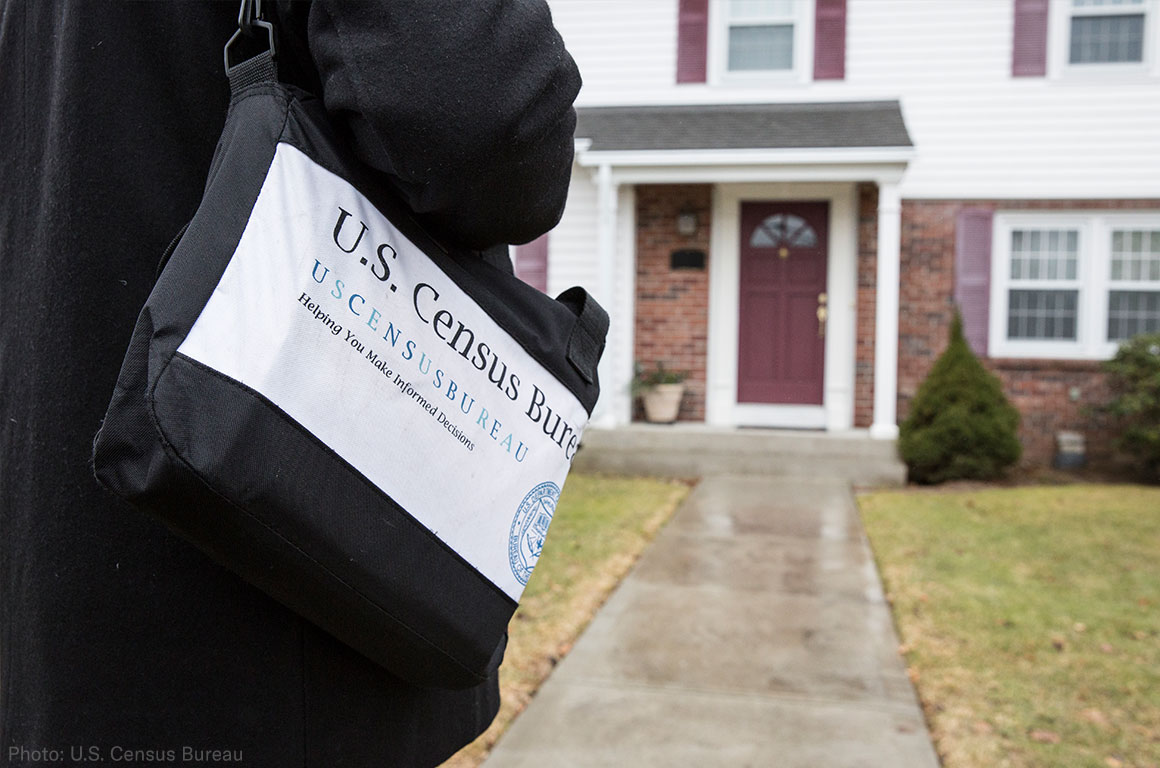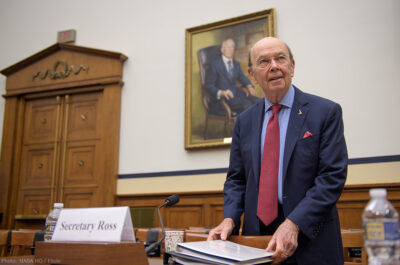
Department of Commerce v. New York
Merit Brief
Once the Supreme Court has granted certiorari and agreed to review a case “on the merits,” each party files merits briefs. The merits briefs argue to the Court why each party should win the case. The Petitioner files the opening brief; the Respondent files a response; and the Petitioner files a Reply Brief.
What's at Stake
Whether the Secretary of Commerce’s decision to add a citizenship question to the Census was arbitrary and capricious and contrary to law.
Summary
The ACLU represented a coalition of civil rights groups, including the New York Immigration Coalition (“NYIC”), in a challenge to the U.S. Department of Commerce’s decision to add a citizenship question to the 2020 census, which the department claimed was for the purpose of facilitating enforcement of the Voting Rights Act. The suit alleged that the citizenship question would cause noncitizen households not to respond to the census, leading to an undercounting, and ultimately, underrepresentation, of communities of color. The suit alleged constitutional violations under the Enumeration Clause and the Equal Protection Clause as well as violations of the Census Act and the Administrative Procedures Act (APA). The APA creates a process by which courts can review a government agency’s justifications for taking an action and strike down the action if the decision is found to be arbitrary or capricious.
The district court found for the NYIC coalition, holding that Commerce Secretary Wilbur Ross violated the APA by acting in a manner that was arbitrary and in spite of overwhelming evidence that the question would cause undercounting of immigrant communities. The court found that the Secretary “failed to consider several important aspects of the problem; alternately ignored, cherry-picked, or badly misconstrued the evidence in the record before him; acted irrationally both in light of that evidence and his own stated decisional criteria; and failed to justify significant departures from past policies and practices.” The court also found substantial evidence that the reasons given for the decision to include the census question were pretextual, and suggested that discriminatory intent may have been found if the plaintiffs had been permitted to gather additional evidence. Because of the mismatch between the Secretary’s stated reasons for adding a citizenship question to the census and the actual evidence on the record, the district court found the ruling to be arbitrary and capicious and vacated it under the APA.
The Trump Administration appealed the ruling to the Supreme Court, which reversed in part and affirmed in part the district court’s holding in a June 2019 decision.
The Supreme Court reversed the lower court’s finding that the Secretary violated the Census Act, but upheld the ruling that the Secretary violated the APA by providing pretextual justification for the decision. The Court concluded that the Secretary provided a sole reason for including the citizenship question—facilitating enforcement of the Voting Rights Act—yet the record showed that the Voting Rights Act played almost no part in the discussions surrounding the decision and was merely a “distraction.” The Court found that the APA required the Secretary to provide a full and honest account of the justifications for its decision, and that his failure to do so justified the district court’s ruling vacating the Secretary’s decision to include a citizenship question on the 2020 census.
The Justice Department and Secretary Ross initially announced that they would abandon the citizenship question and begin to print census forms without it, but President Trump later announced a decision to reverse course and pursue a renewed effort to include the question. In late July, the Trump administration finally abandoned plans to include the citizenship question on the census, a significant victory for voting rights advocates.
Legal Documents
-
05/21/2020
Department of Commerce v. New York: Opinion and Order
Date Filed: 05/21/2020
Download Document-
11/15/2019
Surreply in Support of Motion for Sanctions
Date Filed: 11/15/2019
Download Document-
07/09/2019
Response to Motion to Withdraw
Date Filed: 07/09/2019
Download Document-
07/05/2019
Motion to Amend
Date Filed: 07/05/2019
Download Document-
06/13/2019
Supreme Court Motion for Limited Remand
Date Filed: 06/13/2019
Download Document-
06/05/2019
Reply brief
Date Filed: 06/05/2019
Download Document-
06/05/2019
Reply brief exhibits
Date Filed: 06/05/2019
Download Document-
06/05/2019
Hearing Transcript June 5 Federal Court Hearing
Date Filed: 06/05/2019
Download Document-
05/31/2019
UNREDACTED Census Sanctions Motion
Date Filed: 05/31/2019
Download Document-
05/31/2019
UNREDACTED Census Sanctions Motion Exhibits
Date Filed: 05/31/2019
Download Document-
05/30/2019
Census Sanctions Motion
Date Filed: 05/30/2019
Download Document-
05/30/2019
Census Sanctions Exhibits
Date Filed: 05/30/2019
Download Document-
05/30/2019
Census SCOTUS Letter NYIC Respondents Letter Notice
Date Filed: 05/30/2019
Download Document-
04/01/2019
Department of Commerce v. New York - U.S. Supreme Court Merits Brief
Date Filed: 04/01/2019
Download Document-
01/17/2019
New York Immigration Coalition v. United States Department of Commerce - Merits Brief
Date Filed: 01/17/2019
Download Document-
01/17/2019
New York Immigration Coalition v. United States Department of Commerce - Motion to Dismiss
Date Filed: 01/17/2019
Download Document-
01/15/2019
New York Immigration Coalition v. United States Department of Commerce - Ruling
Date Filed: 01/15/2019
Download Document-
09/21/2018
State of NY v U.S. Dept. of Commerce - Order
Date Filed: 09/21/2018
Download Document-
08/22/2018
Amended Complaint
Date Filed: 08/22/2018
Download Document-
07/26/2018
Motion to Dismiss
Date Filed: 07/26/2018
Download Document-
06/06/2018
NYIC v Dept. of Commerce - Complaint
Date Filed: 06/06/2018
Download DocumentPress Releases
Federal Court Grants Sanctions Against Trump Administration Stemming From Census Citizenship Lawsuit
ACLU Comment on Trump Giving Up Census Fight
ACLU Comment on Possible Trump Census Executive Action
ACLU Comment on Trump Census Lawyer Swap Ruling
ACLU Asks Federal Court to Block Trump’s Ongoing Bid to Add Census Citizenship Question
ACLU Comment on Trump Threat to Reverse Course on Census




